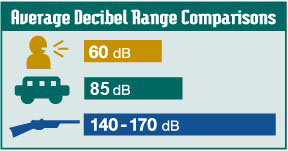Lessons in Shooter Safety
You can prevent hearing loss:
Always wear ear protection while shooting.
OK, listen up. Firearm safety doesn't end with proper firearm handling and care. It also includes hearing protection. This means wearing earplugs or earmuffs whenever you shoot a rifle, shotgun, or pistol.
According to the National Institute on Deafness and Other Communication Disorders (NIDCD), 30 million American adults are exposed to dangerous noise levels each day, and 22 million Americans ages 20 to 69 already have suffered irreversible damage from noise.
An extreme noise like the firing of a shotgun, experienced at close range, can permanently damage your hearing in an instant. This is known as noise-induced hearing loss (NIHL). NIHL can result from one-time exposure to a loud sound like gunfire, and it can also be caused by repeated exposure to harmful sounds over an extended period of time. Just ask any hunter over 50 who has not worn hearing protection!
Understanding the causes of NIHL
The loudness of a sound is measured in units called decibels (dB). An ordinary conversation is approximately 60 dB. City traffic noise can reach 85 dB. Firearms discharge can reach an ear-piercing 140 to 170 dB.
Loud noises at or above 85 dB can permanentely damage the inner ear. Not only can sudden loud noises, like gunshots or firecrackers at close range, result in hearing loss, but prolonged exposure to machine noise in a workshop can be damaging, too.
Fact: Noise-induced hearing loss is one of America's most common workplace injuries.
Is NIHL preventable?
Absolutely. You can help prevent NIHL by understanding the hazards of noise and by practicing good hearing health, whether in the field, at home, or at work.
- Know which noises cause damage (85 dB and above).
- Wear earplugs, earmuffs, or other hearing protection devices when involved in a loud activity such as shooting.
- Be alert to hazardous noises in the environment.
- Make family, friends, and fellow shooting enthusiasts aware of noise hazards.
- If you're having trouble hearing, if sounds you hear are muffled and distorted or if there is a ringing or roaring sound in your ears, see a doctor at once! Your doctor may refer you to an otolaryngologist, a doctor who specializes in the ear, nose, and throat. You may also have your hearing tested by an audiologist.
Contact the National Institute on Deafness and Other Communication Disorders (NIDCD) with your questions about NIHL at:
Toll-free voice: (800) 241-1044
Toll-free TTY: (800) 241-1055
Fax: (301) 770-8977
E-mail: nidcdinfo@nidcd.nih.gov
Internet: www.nidcd.nih.gov
Presented by WISE EARS!®, a coalition of government agencies, nonprofit organizations, businesses, industries and unions to prevent noise-induced hearing loss.
Top |